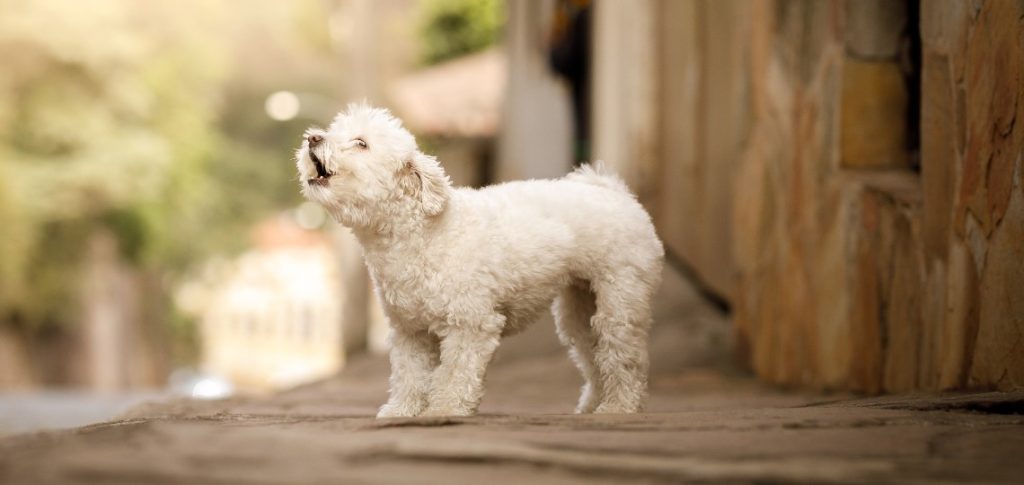Little dogs definitely have a reputation as barkers. If you’re considering adopting a Havanese or if you are curious about your dog’s behavior, you might be wondering if they typically bark a lot.
Havanese definitely do bark, however, so do all dogs, dog barking comes with the territory. This little dog is not known for being a barker, but there are situations that the dog will bark in. Specifically when the doorbell rings, sometimes when people walk by the front window and if the neighbourhood cat jumps into the yard.
Our little Havanese Nessie will bark at all of these situations. We have also trained her to bark at the back door when she wants to go outside, so she knows that being vocal is part of the deal.
You can easily train your Havanese not to bark or be as vocal.
Is the Havanese Breed Yappy?
It is interesting when people talk about dogs being yappy as opposed to barking or having a loud bark. I would say that Havanese can and do bark, but yappy wouldn’t be a word that I would use to describe these dogs in comparison to other dogs.
I’m not sure what you think yappy is but for me, it typically means annoying and uncontrollable. Now I will say that sometimes these dogs can be a little yappy. Our Nessie will bark at things outside, and sometimes when people come over.
In general, Havanese are not considered a yappy breed or one that won’t stop barking (source). It doesn’t mean that they will not bark or make noise at all, just that they are not like other yappy breeds. Havanese can actually be great watchdogs, and will definitely bark at people coming onto your property.
Usually, when you acknowledge a Havanese’s barking during the barking they will stop barking. Sometimes Nessie struggles with stopping when a person comes to the door. We have been working on that with her and trying to get her to use her “inside” voice or to stop barking after the first few initial barks. It is a process but we are making progress.

Temperament and Vocality
Havanese are very chilled out and relaxed, and so they only bark to welcome guests or to ward off whoever comes knocking on your front door. This is pretty generic of all dogs, however, and is hardly something you can avoid with any breed. The best part about Havanese is that once the person is inside the house and welcomed, the barking is over.
Interestingly enough, the bark from a Havanese dog is very deep, much more so than other dogs of the same size. When a Havanese barks from inside your house, it sounds as though you have an attack dog hidden behind the front door. People are often surprised when they get inside and see the little Havanese sitting and waiting to be petted, confused about how such a deep, imposing sound came from such a small and adorable furball. This is one of the reasons Havanese make fantastic watchdogs. They will alert you of any intruder and, hopefully, scare the intruder away with their exaggerated barks.
Our Nessie also has a high pitched bark that we are training her to stay away from when we are home and someone comes to the door, it is a work in progress. As it goes with intelligent dogs she is learning but really loves when people come over. She does have a little attention seeking barking in her.

Training is Required
If you leave your dog alone too much, especially outside for long periods of time, barking can become a problem. If your Havanese dog is a little more vocal, then you will need to manage this behaviour regularly with some canine education. Teaching them to stop barking on command will be a work in progress, but something that will be of great benefit.
It’s a delicate balance. You definitely want them to start barking, or sound the alarm, but you don’t want them to continue on and on. There are multiple training methods that you can employ, ad we will discuss some below. It is important however to remember that you need to work with your dog and make sure that they know what you are trying to get them to do.
Which is Better Male or Female Havanese?
When it comes to barking there really isn’t any difference between males and females. Getting them to stop barking can be different for different genders.
This is especially true if you got your dog fixed early in the process. Hormones in all dogs can alter natural behavior, especially with these small dogs.
It has been said that female Havanese are little more territorial, but also a little more demanding when it comes to affection. I can certainly vouch for the fact that female Havanese definitely want attention. Our little Nessie will come and cuddle often and loves when we pet her. When you stop petting her she will find your hand and try to convince you to continue.
If you are trying to choose between the two types, there are a couple of things to consider like the cost of fixing them and the attitude of a male dog vs a female dog. usually, males are less expensive to fix.
What Can I do To Manage the Barking?
Ok so if you are here because you already have a Havanese and you want to adjust its barking behaviour by getting it to stop barking, or you are getting a Havanese and you want to start early let’s look at some training. The idea is to get all that noise under control and focused in the right direction so you can be a proud mom or dad.

- After a few barks distract the dog. Call them away from what they are doing and tell them to stop. This distraction usually works. Often the dog is trying to warn you of something, and when you acknowledge them they stop because that is what they are after. You don’t want your dog to completely ignore you.
- Some people have found that a shaker can be useful to create another sound in the space. This will take them from their barking to thinking about the shaker.
- Indoor ultrasonic correction devices can work to deliver a warning sound. They do not completely prevent barking as they usually don’t initiate till after the first 2-3 barks. Here is an example of one on Amazon.
- Sometimes it is helpful if the outdoor view is controlled. If your dog barks at everything outside then you may need to limit their ability to see outside. You can do this with blinds and semi-transparent films on parts of the window they can see out of.
- Bark Collar. Obviously, you need to be careful with which type you get, and you may need to try a few different kinds to see how it goes. Here is an example of one that doesn’t shock the dog at all, but uses sounds and vibration to help you train your dog. If you need something stronger, make sure you consult your vet on what is safe and what isn’t.
What are the Negatives of the Havanese?
While Havanese are generally known for their friendly and affectionate nature, there are some potential downsides or challenges associated with the breed. While this list may be called negatives, what they really are is things to consider and make sure you address when you get a Havanese. Our advice is to start training early.
Some negatives or unwanted behaviours of owning a Havanese dog may include:
- Grooming: Havanese require regular grooming due to their long, silky coat, which can become tangled and matted if not properly maintained. This includes regular brushing, bathing, and occasional trimming or professional grooming. – Easy just get your dog a good groomer.
- Separation anxiety: Havanese are social animals that form strong bonds with their families, which can sometimes result in separation anxiety when left alone for long periods. It is essential to gradually train your Havanese to be comfortable when left alone and provide mental stimulation to prevent anxiety-related behaviours like excessive barking, bad habits, noisy moments, and chewing.
- Nessie is good, she doesn’t suffer from this.
- Barking: Havanese can be somewhat vocal, and they may start barking more frequently than other breeds. That is why you are here, asking the question do Havanese bark a lot? Proper training, positive reinforcement and socialization can help reduce excessive barking. The Havanese bark is also sometimes high-pitched and loud even for a small dog.
- Nessie is a bit of a barker when people come over or the Amazon guy comes buy. We have been teaching her to limit the number of barks and also to bark like a quiet breed.
- Housebreaking: Some Havanese may be more challenging to housebreak or complete their potty training compared to other breeds. Consistent training, supervision, and patience are crucial for successful housebreaking. The Havanese bark is a good tool to use in this situation, we get Nessie to go to the door and bark when she wants to go outside. This kind of dog behavior is good for us and her.
- Exercise: While Havanese are adaptable and can adjust to various living situations, they still require daily exercise to stay healthy and happy. This includes walks and playtime, which can be a challenge for individuals with busy schedules or limited mobility. Remember that the Havanese is a toy breed and will need some exercise.
- Health issues: Like all breeds, Havanese are prone to certain health issues, including hip dysplasia, patellar luxation, and eye disorders. Regular veterinary care, proper nutrition, and responsible breeding can help minimize the risk of these issues.
It’s important to note that each Havanese dog is an individual, and their temperament, behavior, and health can vary widely. Proper research, training, and care can help mitigate many of the potential challenges associated with the breed, making them a loving and enjoyable companion for the right owner.
Can Havanese Be Left Alone?
Yes Havanese can be left alone.
Havanese can be left alone for short periods, but they are a breed that forms strong bonds with their family and may be prone to separation anxiety if left alone for too long. Ideally, they should not be left alone for more than 3 to 4 hours at a time, especially during their early years.
We however do leave Nessie alone fro 8-9 hours at a time, especially when we are working away from home. You need to follow veterinary advice and veterinary guidance for your dog.
To help your Havanese become comfortable with being alone, gradually introduce them to short periods of separation and gradually increase the duration. This will help them build confidence and feel secure when left alone.
Additionally, providing mental stimulation, such as toys and puzzles, can help keep them occupied while you are away. Ensuring they have a comfortable, safe space to rest in, like a crate or a designated area in your home, can also help reduce anxiety.
If you have a busy schedule or will be away from home for long periods, consider arranging for a pet sitter, dog walker, or doggy daycare to ensure your Havanese receives adequate socialization, exercise, and care during your absence.
